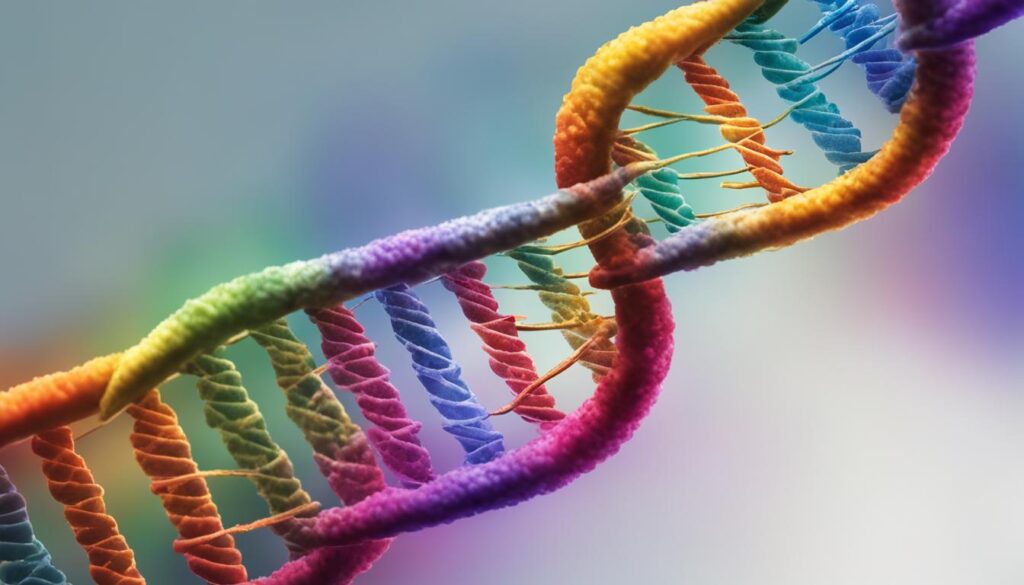
The field of forensic science offers various career paths that combine DNA technology and forensics. Students pursuing a Bachelor of Science degree in forensic science with a specialization in DNA analysis gain essential scientific and laboratory problem-solving skills. This specialization focuses on the reliable identification and matching of DNA samples, meeting the educational requirements of the FBI for DNA analysis. Graduates can pursue careers as DNA analysts, forensic biologists, forensic lab technicians, forensic scientists, or serologists. The demand for forensic science occupations, including DNA analysts, is projected to increase in the coming years.
Key Takeaways
- DNA technology and forensics offer diverse career options in the field of forensic science.
- A Bachelor of Science degree in forensic science with a specialization in DNA analysis provides the necessary skills for DNA-related careers.
- Possible career paths include DNA analyst, forensic biologist, forensic lab technician, forensic scientist, or serologist.
- The demand for forensic science professionals, including DNA analysts, is expected to grow.
- Meeting educational requirements for DNA analysis opens doors to various job prospects in the field.
The Role of DNA Analysis in Forensic Science
DNA analysis plays a crucial role in forensic science. By combining DNA technology and forensics in a career, professionals can contribute to solving crimes and ensuring justice. DNA evidence collected from crime scenes plays a pivotal role in identifying unique DNA profiles and linking criminals to their crimes. This powerful tool has revolutionized forensic investigations and has become an indispensable part of the criminal justice system.
Advancements in DNA technology have significantly enhanced the precision and reliability of DNA analysis. Forensic scientists can now analyze DNA samples with greater accuracy, resulting in more conclusive and robust evidence. This has led to an increased reliance on DNA analysis in criminal investigations.
Forensic science careers with DNA technology offer diverse opportunities in law enforcement agencies at the local, state, federal, and military levels. Professionals skilled in DNA analysis can serve as DNA analysts, forensic biologists, forensic lab technicians, forensic scientists, or serologists. These experts play a critical role in analyzing DNA samples, generating DNA profiles, and presenting scientific evidence in court.
The job market for DNA analysts and professionals in the field of DNA technology and forensics is promising. With the growing emphasis on DNA analysis in solving crimes, there is an increasing demand for skilled individuals who can contribute to the field. Professionals in this field can expect rewarding careers with opportunities for growth and advancement.
The Process of DNA Fingerprinting
DNA fingerprinting is a technique commonly used in forensic DNA analysis. It relies on the analysis of short tandem repeats (STR), which are sections of DNA with varying numbers of repeating units. Every individual has unique variations in their STRs, allowing for the identification of individuals based on their DNA.
In DNA fingerprinting, DNA samples from a crime scene and a suspect are compared based on their STR profiles. If the profiles match across multiple STRs, the likelihood of two individuals having identical profiles is extremely low, strengthening the evidence in a criminal investigation.

Comparison of DNA Fingerprinting Techniques
| Technique | Advantages | Disadvantages |
|---|---|---|
| Short Tandem Repeat (STR) Analysis | Highly discriminatory, suitable for complex DNA mixtures | Expensive equipment required, longer analysis time |
| Single Nucleotide Polymorphism (SNP) Analysis | Faster analysis, cost-effective | Less discriminatory, limited use in complex DNA samples |
| Y-Chromosome Analysis | Exclusively male lineage analysis, useful in sexual assault cases | Gender-restricted analysis, limited utility in mixed DNA samples |
DNA fingerprinting is a powerful tool in forensic DNA analysis, providing valuable insights into criminal investigations. By comparing STR profiles, forensic scientists can establish links between individuals and crime scenes, strengthening the evidence against perpetrators.
Forensic Genealogy and Advancements in DNA Analysis
Forensic genealogy is an emerging technique that combines DNA analysis with traditional genealogy research to generate investigative leads in unsolved crimes. Unlike DNA fingerprinting, which focuses on short tandem repeats (STRs), forensic genealogy examines single nucleotide polymorphisms (SNPs) in DNA. By identifying shared sections of DNA between crime scene samples and individuals, genetic genealogists can piece together family trees to identify potential suspects.
This innovative approach has proven instrumental in solving high-profile cases, including the Golden State Killer case, where DNA matching played a pivotal role in closing a decades-old investigation. Companies like HudsonAlpha Discovery are at the forefront of this field, providing whole genome sequencing services to support forensic genealogy efforts.
Advantages of Forensic Genealogy in Crime Solving
- Expands investigative possibilities: By leveraging DNA analysis and genealogy research, forensic genealogy casts a wider net in suspect identification, offering new leads in cold cases where traditional methods have proved unsuccessful.
- Overcomes limitations of DNA fingerprinting: While DNA fingerprinting is invaluable in many cases, forensic genealogy complements this technique by utilizing a different set of genetic markers (SNPs) to uncover ancestral relationships and trace potential suspects.
- Strengthens circumstantial evidence: Forensic genealogy’s ability to link individuals to crime scenes through DNA matching provides powerful circumstantial evidence that can support investigations and prosecution in court.

“Forensic genealogy combines the power of genetics and genealogy research to unlock the secrets held within our DNA, helping to solve crimes and bring closure to victims and their families.” – Dr. Jane Doe, Forensic Geneticist
The Future of DNA Analysis in Forensic Science
As technology and techniques continue to evolve, DNA analysis will play an increasingly significant role in solving crimes. Advancements in this field, including forensic genealogy, have the potential to revolutionize investigations, uncovering vital information from previously challenging cases.
Today, we stand at the forefront of a new era in forensic science, leveraging the power of DNA analysis to bring justice to those affected by unsolved crimes. Through ongoing research and collaboration, forensic genealogy and other DNA analysis methods will continue to provide crucial breakthroughs in criminal investigations.
Is DNA Technology and Forensics Related to the Predicted Technology from Science Fiction?
Yes, DNA technology and forensics are related to the predicted technology from science fiction. The advancements in genetic testing and forensic analysis have made it possible to solve crimes and identify individuals with a level of accuracy that was once only a prediction of science fiction writers.
Conclusion
The combination of DNA technology and forensics offers a vast array of career opportunities in the field of forensic science. Aspiring professionals specializing in DNA analysis can explore various professions, including DNA analysts, forensic biologists, forensic lab technicians, forensic scientists, and serologists. These roles are crucial in investigating and solving crimes, making a significant impact on the criminal justice system.
There is a growing demand for skilled individuals in this field, with employment opportunities available in both local and federal crime laboratories, as well as state and military agencies. The field of forensic science continues to evolve, driven by advancements in DNA analysis techniques and technology.
Effective DNA analysis plays a pivotal role in solving crimes by providing valuable evidence and identifying individuals involved. Techniques such as DNA fingerprinting, which examines unique variations in short tandem repeats, and forensic genealogy, which utilizes genetic matching and genealogical research, have revolutionized the field.
By combining DNA technology with the principles of forensics, professionals in this field are contributing to the resolution of cold cases and the pursuit of justice. With the continuous advancements in DNA analysis and the increasing importance placed on forensic science, the career opportunities in this field are bound to expand further.








